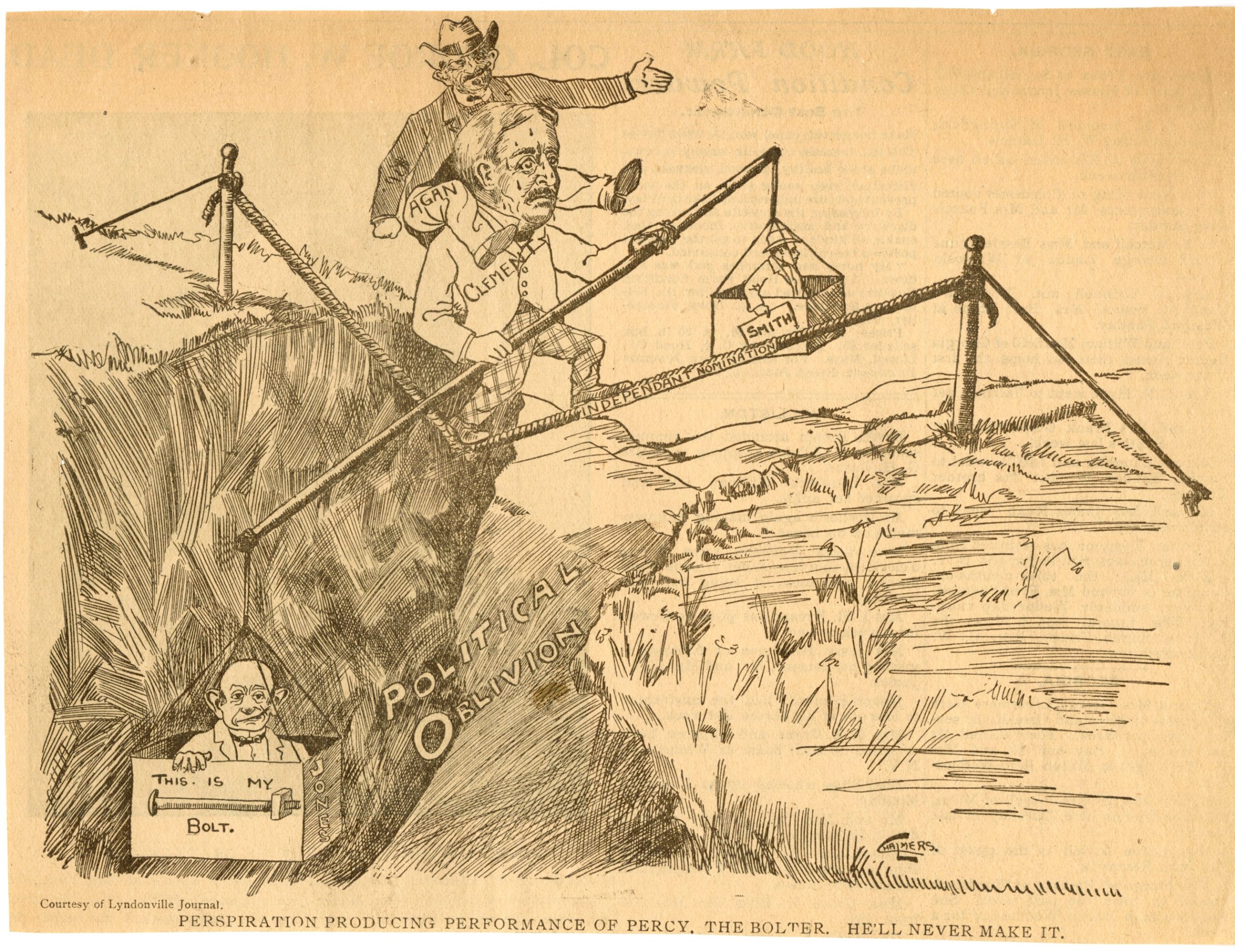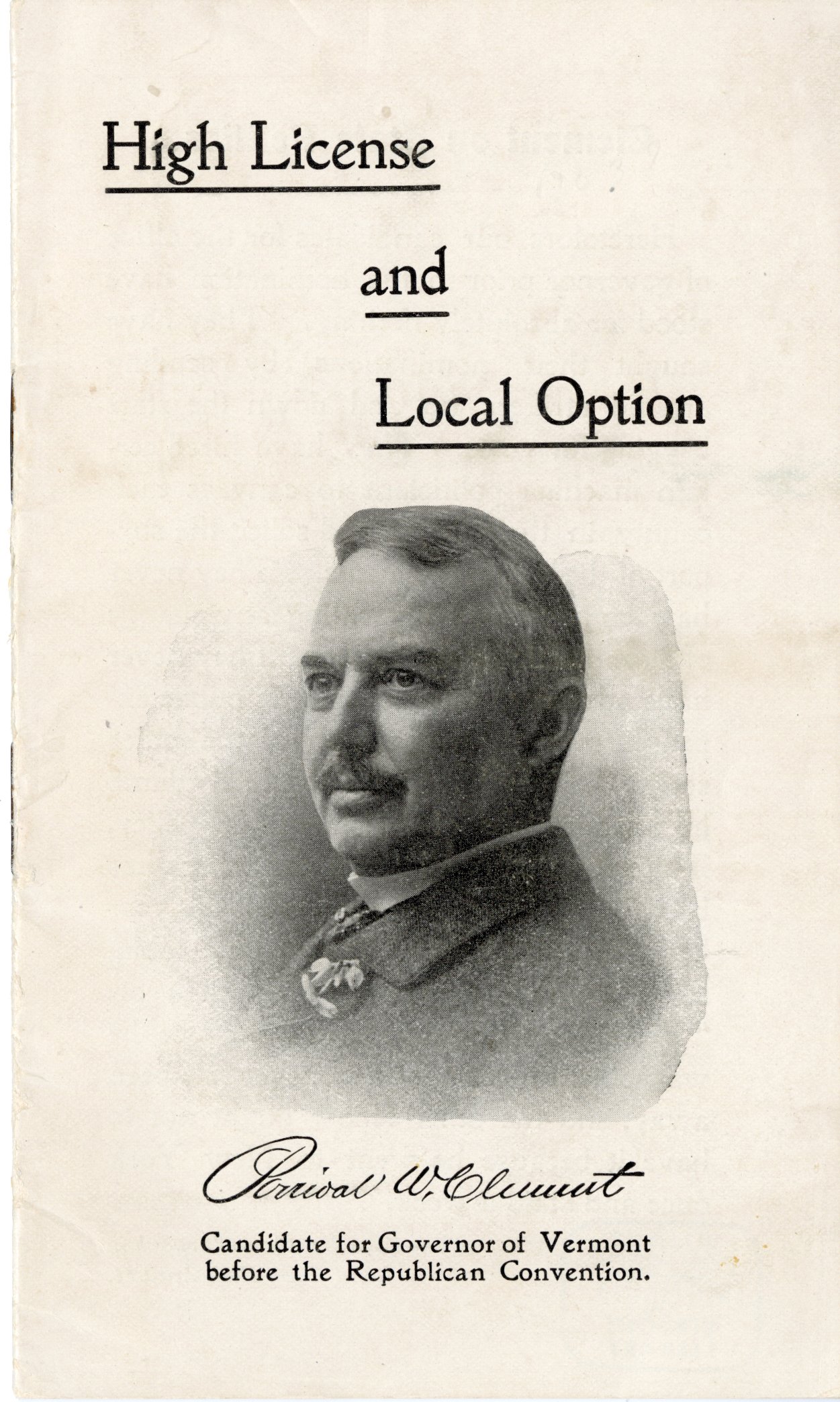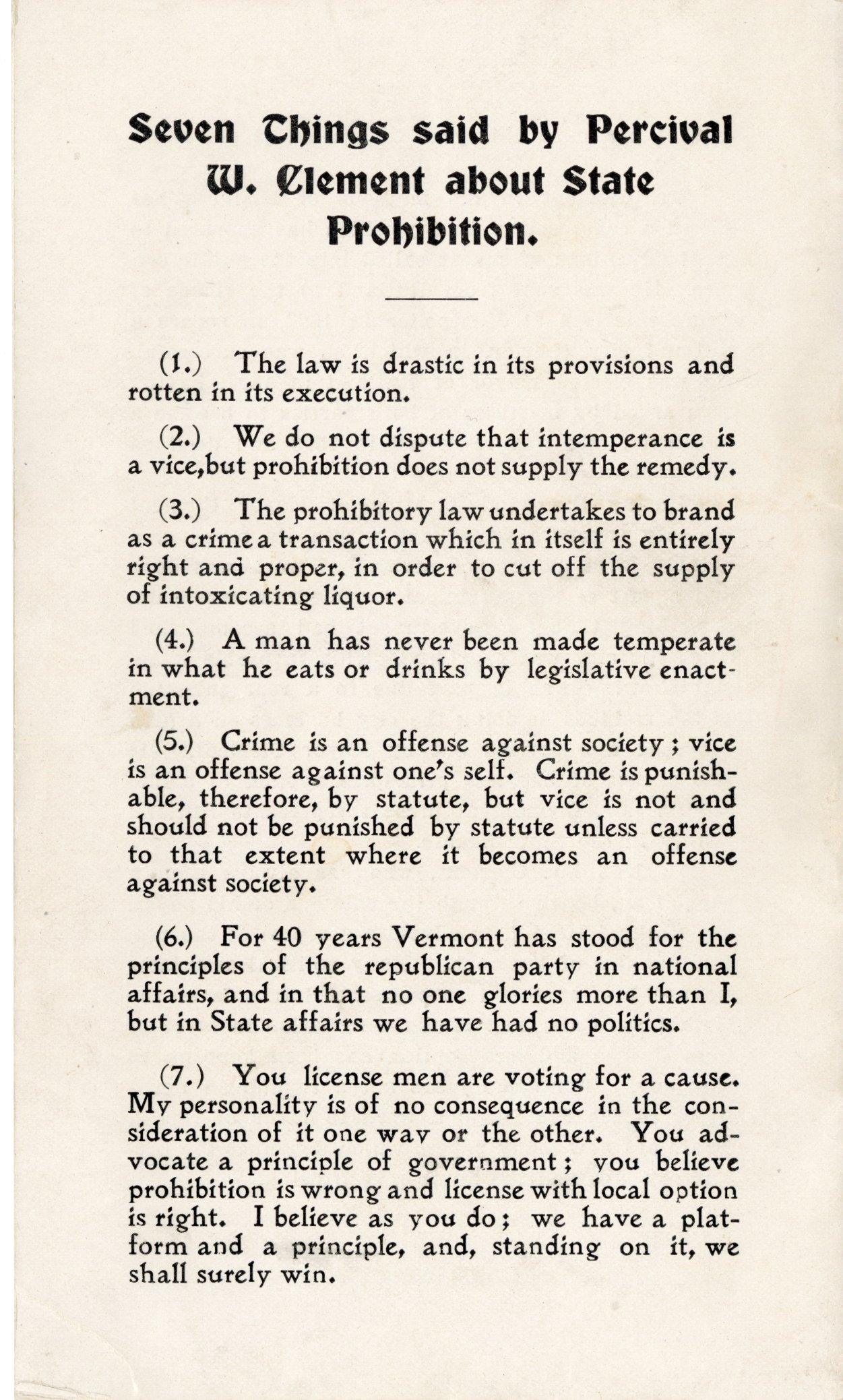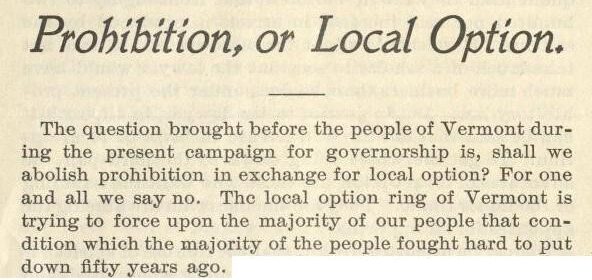As the 2022 election season draws to a close, we offer an article by graduate student Juniper Oxford about the 1902 election, when prohibition in Vermont was the central contentious issue. Juniper conducted research for the article in Special Collections during Professor Dona Brown’s Spring 2022 seminar, Local History in a Global Context.
Vermont’s 1902 election cycle brought forth an issue that had been brewing for several decades: the increasing unpopularity of statewide Prohibition. Long before national Prohibition, Vermont enacted a statewide prohibition on alcohol in 1853. Although the state saw almost fifty years of prohibition officially, the law was not so easily enforced, nor was it popular in all corners. By 1902, the election gave an opportunity for Vermonters to voice their position on statewide prohibition through a candidate and, in the following year, by direct ballot initiative.
In 1902, Percival Clement attempted to gain the Republican nomination for governor of Vermont, seizing on the opportunity to present himself as the candidate for “high license,” granting the license to sell liquors at what was considered high rates, and “local option,” an alternative to a total prohibition of sale that allows local municipalities to vote for whether they permit the sale of alcohol within their jurisdictions.
Front and back covers of a 1902 Clement campaign brochure. Clement proclaims, “You license men are voting for a cause…. My personality is of no consequence …. We have a platform and a principle, and, standing on it, we shall surely win.”
In an opposition pamphlet, “Prohibition, or Local Option,” Joseph Harris of Ludlow, Vermont, articulated several arguments in favor of Vermont Prohibition and against local option. Harris claimed that other states that implemented local option policies saw an increase in public disturbance, that local option proponents were driven by greed to participate in the potential newly legal commerce and are “nursing the appetites for strong drinks,” and that over ninety percent of women were in favor of Prohibition and should have a say in voting against local option. Contrary to Clement’s claims of corruption in Vermont politics, Harris believed it was the local optionists who had corruption in their hearts. Additionally, Harris claimed that Clement sought the direct ballot initiative for local option because he could not and would not manage to pass the bill through the Vermont legislature.
Failing to secure the Republican nomination, with the party instead nominating John McCullough, Clement and his supporters were bitter at their defeat. The faction alleged corruption at the convention, including bought-and-paid-for supporters. Expanding his platform to focus on corruption in the political process in addition to his high license and local option position, Clement eventually declared a third-party candidacy as the Local Option candidate. Although the Republican convention included the local option stance in its platform due to the rallying of its supporters, Clement’s candidacy turned into a referendum on Republican-led politics in the state of Vermont.
 “Perspiration Producing Performance of Percy, the Bolter. He’ll never make it.”
“Perspiration Producing Performance of Percy, the Bolter. He’ll never make it.”
No candidate for governor or lieutenant governor managed to receive a majority of the popular vote. Clement received second place ahead of a major party candidate—Democrat Felix McGettrick. The Local Option candidates easily received second place in both races for governor and lieutenant governor, tripling the number of votes received by the Democratic nominee for lieutenant governor and quadrupling the votes of the Democratic nominee for governor. Since the Republican Party failed to receive an electoral majority, although they had received a plurality of the vote, the election was to be decided in the Vermont legislature, where the Republican majority ensured their victory.
Republican John McCullough received 45.6% of the vote, Democrat Felix McGettrick received 10.5%, Prohibitionist Joel Sherburne received a respectable 3.6%, and Local Optionist Percival Clement received 40.3%. The Prohibition Party existed in Vermont politics and fielded candidates for two decades before the 1902 election, but Sherburne received the Prohibition Party’s highest share of the vote total since their inception and of any election until their last in 1928, unsurprising as the Local Option candidate was Sherburne’s ideological opponent in 1902. The Prohibition candidates for U.S. representative also saw an increase in the vote totals, with 4.2% and 5%, respectively. While Clement’s showing was the most significant factor in why no candidate managed to attain a majority of the vote, Sherburne’s higher-than-expected number of votes certainly aided in pushing the election to the Vermont legislature.
The most practical solution to the Republican Party’s electoral problem was to introduce legislation to eliminate the need for a “single issue party.” The legislature voted to allow an initiative on local option in December 1902, shortly after the election. The Vermont Local Option Alcohol Sales Act was enacted as a result of a direct ballot initiative and was approved on town meeting day, February 3, 1903. Although the high license and local option plank was a part of the Republican platform, it was politically advantageous to promptly enact the initiative because of its seemingly broad support among Vermonters and because a third-party candidate who ran on the issue lost the election by five percentage points. No third-party candidate for governor of Vermont has come near the 40.3% of the popular vote Clement received since the 1902 election.
Despite Clement’s claim of his “personality being of no consequence,” he ran twice more after his initial run as the Local Option candidate in 1902. He ran unsuccessfully in 1906 as the independent-Democratic candidate, and successfully in 1918 as the Republican candidate. In the sixteen years after the 1902 election, Vermonters were given the opportunity to opt-out of the prohibition of alcohol by local option. National Prohibition was enacted by constitutional amendment on January 9, 1919, seven days before Percival Clement took office as governor of Vermont.



